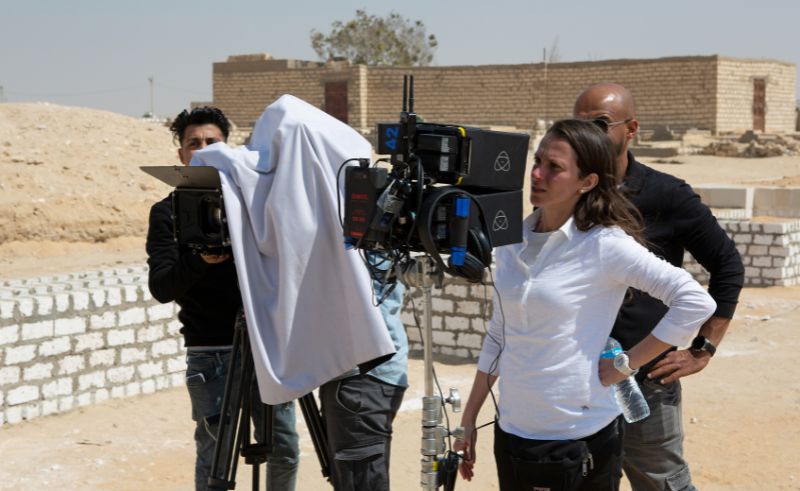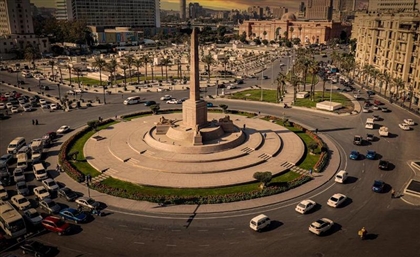How Short Film 'Spirit of Akhenaten' Highlights Life of a Lost King
With the premiere of 'Spirit of Akhenaten' at the Cairo Opera House, we speak to filmmaker Dalia El Abd to hear her story - and how it resonated with that of Egypt's lost king, Akhenaten.

Living in the age of late capitalism usually means having to choose between doing what will bring you stability and what will bring you joy; a choice we all have to make, to choose to live for others or yourself. Accordingly, a new phenomenon was born, where we - the audience - stared in confusion at successful people quitting their corporate jobs and going on journeys of self-discovery. One such story is that of Dalia El Abd, ex-Marketing Manager of Edita, Al-Ahram Beverages, and La Poire, who quit her job and sold her car to travel around Africa and Asia to find herself. A few years later, El Abd resurfaced with a production company, Blessing Films, which premiered its first film, ‘Spirit of Akhenaten’, at the Cairo Opera House.
While El Abd’s story is familiar, and is still very much a late capitalist phenomenon, its origin goes all the way back to Ancient Egypt, particularly to the 18th dynasty, with King Amenhotep IV - or, as he named himself, Akhenaten.
It seems like fate intervened to allow the spirit of Akhenaten, a benevolent and loving king lost to time, to meet El Abd on top of Jabal Moussa, one of the last stops on her journey of self-discovery. As she contemplated their similarities, El Abd found herself going down a path that ended with the production of her company’s debut film.
Akhenaten was the son of the mighty Amenhotep III and his wife, Queen Tiye. Egypt ruled an empire that spanned from Syria in west Asia to the Nile River's fourth cataract in modern-day Sudan during their reign; an empire of land, riches, and unimaginable power. Akhenaten ascended to the throne and became a pharaoh of Egypt roughly around 1353 BC and ruled for 17 years, descending from the throne at the age of 28. Akhenaten was, above all, a religious reformer who made the Aten, the sun disc, the focus of religious life in Egypt. He further renegades by erasing the names of Amun, a supreme Egyptian deity, and his consort Mut from temples, monuments, and documents throughout Egypt. Essentially, Akhenaten was a monotheist who reformed Egypt’s religion, transforming it from a polytheistic dogma to a monotheistic one.
The new king ascended the throne bearing the name Amenhotep IV - a name that means ‘Amun is pleased’ - but committed himself to his religious reform by changing his name to ‘Akhenaten’ in his sixth year of rule, a name that loosely translates to the ‘Benevolent one of the Aten’. Akhenaten built a new metropolis in honour of ‘the Aten’ in the desert, in a place we now know as Amarna. It was chosen for its location, as the sunrise has a symbolic value there, where it rises through a breach in the surrounding ridges of Amarna, allowing the sunrise to be ‘read’ as the hieroglyph spelling 'Horizon of the Aten’, the name of his new city.
The entirety of Akhenaten’s reign was full of social, political, and cultural upheaval due to his personal religious inclinations. Not only was Akhenaten a monotheist, but he wholeheartedly believed in the sanctity of the soul, and refused to entertain the thought of violence. Thus, when rebellions took place in other parts of the empire, Akhenaten refused to send food, soldiers, and ammunition based on the belief that war was not the answer; peaceful diplomatic talks were. Many historians criticised Akhenaten, claiming that he was a poor politician, but it was Akhenaten’s desire to find himself and encourage an ethic of love that drew Dalia El Abd to him and his story.
In 1335 BC, it was declared that Akhenaten had disappeared. His last years are shrouded in mystery and he is said to have descended the throne in the name of asceticism, choosing to walk the desert in search of his god, and by extension, himself. Akhenaten ended up being lost to history, with the reforms he made becoming overturned by his son, King Tutankhamen, while Akhenaten was only remembered as “the heretic king.”
“Love was the fuel to Akhenaten’s engine,” Dalia El Abd tells CairoScene. When El Abd founded Blessing Films, she chose a name for the studio that resonated with that sentiment, which powered Akhenaten as much as it inspired her. As El Abd puts it, “It’s a blessing to be able to do what I love.”
El Abd’s story is similar to Akhenaten’s in many ways. El Abd was a successful woman in a field that demanded a sharp wit and cleverness that only a few innately possess. Yet, she grew unhappy, and despite her job giving her financial stability and social prestige, she didn’t feel fulfilled. In a fit of rebellion, El Abd quit her job, sold her car, and chose to travel the African and Asian continents in search of something that resonated with her, brought her closer to herself, and made her soul sing. El Abd found herself through love, as did Akhenaten.
Thus, El Abd devoted four years of her life to the production of a film about the life and love of a Pharaoh whose story is lost to time. In fact, one of those four years was spent at one of Akhenaten’s remaining temples, where she studied drawings and images of musicians, performers, and audiences in the hope of imagining what music was like during his reign, so she could compose music for the film. Additionally, she’s the first person to translate Akhenaten’s Great Hymn to Arabic, a hymn that was sung in the soulful voice of Aida El Ayoubi during the film’s premiere.
Every attendant of the premiere of the Spirit of Akhenaten at the Cairo Opera House felt touched by the Akhenaten’s journey of self and compassion being brought to life through Dalia El Abd and her team’s labour of love.
Trending This Week
-
Apr 10, 2024
























